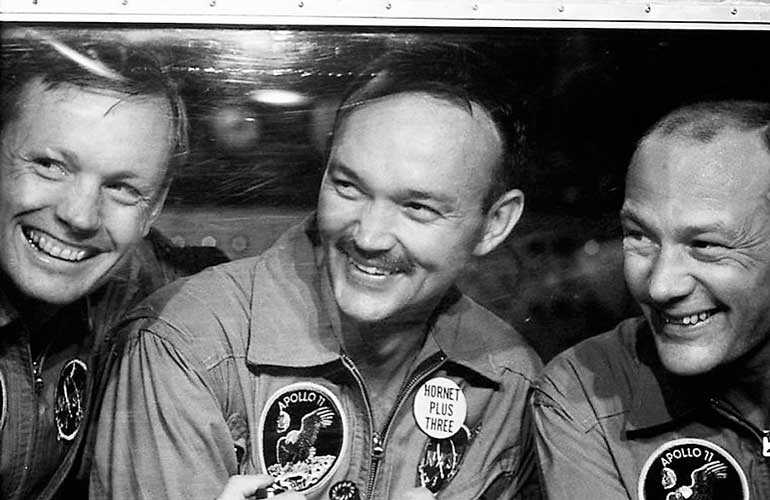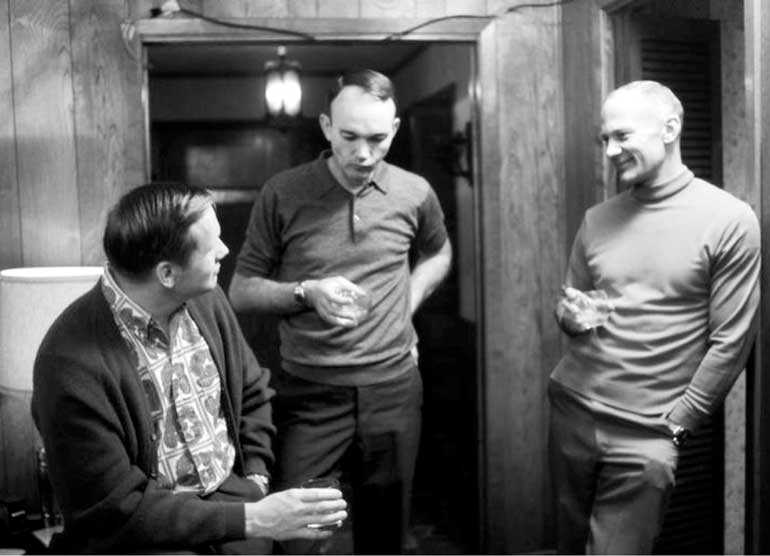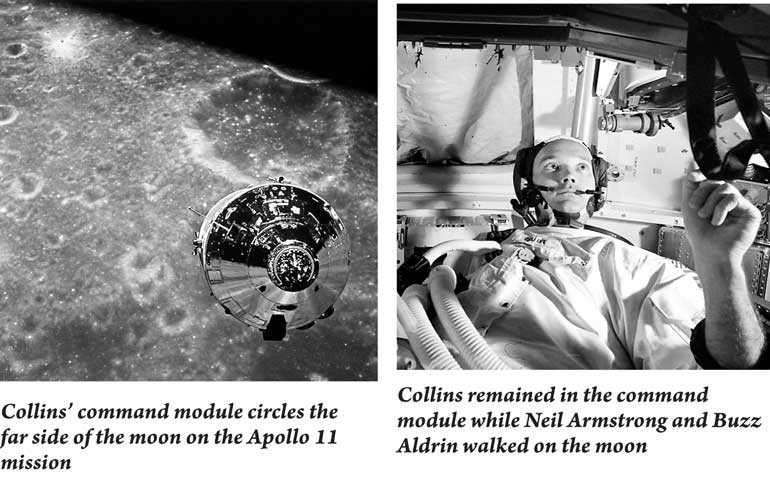Wednesday Feb 25, 2026
Wednesday Feb 25, 2026
Saturday, 20 July 2019 00:10 - - {{hitsCtrl.values.hits}}

Neil Armstrong, Michael Collins, and Buzz Aldrin smile through the window of their isolation quarters aboard the USS Hornet on 24 July, just days after Armstrong and Aldrin walked on the moon while Collins stayed behind, orbiting all alone

Neil Armstrong, Michael Collins, and Buzz Aldrin talk over drinks in Houston in March 1969, four months before their mission to the moon
esquire.com: On 20 July 1969, at 1:46 p.m., Neil Armstrong and Buzz Aldrin separated the Eagle landing craft from the Apollo 11 command module. Michael Collins stayed behind, firing the rockets, moving about two miles away from his colleagues—and 250,000 miles from humanity on earth. He was absolutely and completely alone.
“Keep talking to me, guys,” Collins radioed to the men as he watched their landing craft get smaller and smaller.
At 3:08 p.m., Armstrong and Aldrin, flying feet first, fired the module’s descent engine for the first time, preparing to land on the moon. Collins, all alone, watched as they made their way down to the chalky, grey surface. He radioed to Mission Control the first report of the descent, saying, “Everything’s going just swimmingly. Beautiful!”
At 10:56 p.m., Armstrong placed his left foot on the moon, the first human to ever step foot in outer space. Aldrin snapped photos from the spacecraft, then took his own moon walk. An hour later, the men planted the American flag on the moon’s surface, and Richard Nixon called via Mission Control to say: “Neil and Buzz. I am talking to you from the Oval Room at the White House. And this certainly has to be the most historic telephone call ever made. For every American this has to be the proudest day of our lives.”
While his colleagues talked to the President, Collins sat alone in the command module, circling the moon. When the spacecraft swept behind the moon for 47 minutes at a time, he lost all radio transmissions to and from Mission Control. He was more alone than ever.
When Armstrong said the legendary, “That’s one small step for man, one giant leap for mankind,” Collins missed it.
“I am alone now, truly alone, and absolutely isolated from any known life. I am it,” Collins later wrote. “If a count were taken, the score would be three billion plus two over on the other side of the moon, and one plus God knows what on this side.”
A note from the mission log said: “Not since Adam has any human known such solitude as Mike Collins.”
In the 50 years since that historic mission, Armstrong and Aldrin have become household names. Collins, who was just as critical to the mission, has avoided the same glare of the spotlight. He’s mostly eschewed media requests over the years, though he’s done a spattering of interviews for the 50th anniversary of the Apollo 11 moon landing, which is this Saturday.
For the last anniversary—the 40th—Collins declined all interviews, instead issuing a statement through NASA, in which he groused about the culture’s obsession with fame and heroism.
“Celebrities? What nonsense, what an empty concept for a person to be, as my friend the great historian Daniel Boorstin put it, ‘known for his well-known-ness.’ How many live-ins, how many trips to rehab, maybe—wow—you could even get arrested and then you would really be noticed,” he said. “Don’t get me started.”
His colleagues Aldrin and Armstrong dealt with the fame in very different ways—but it wreaked havoc on both their lives. Armstrong spent decades desperately avoiding recognition.
“Neil was the sort of person that didn’t want any of that. He didn’t want celebrity. He didn’t want the spotlight. He tried everything he could to lead a normal life, short of being a recluse,” biographer James Hansen said. Eventually, Armstrong’s marriage fell apart. Aldrin, who was more eager to embrace the attention, suffered from depression and alcohol addiction and was twice divorced in the 1970s alone.
Now, with five decades of hindsight, it seems Collins may have, in fact, had the best view of the moon.
(Source: https://www.esquire.com/news-politics/a28400600/michael-collins-today-apollo-11-astronaut-moon-landing/)
